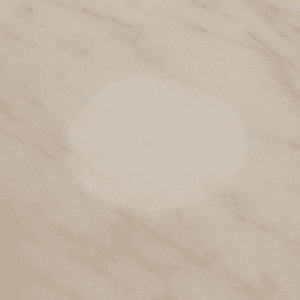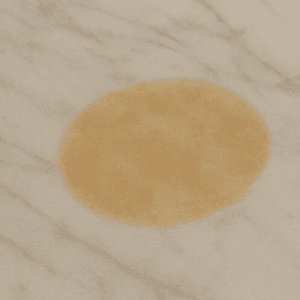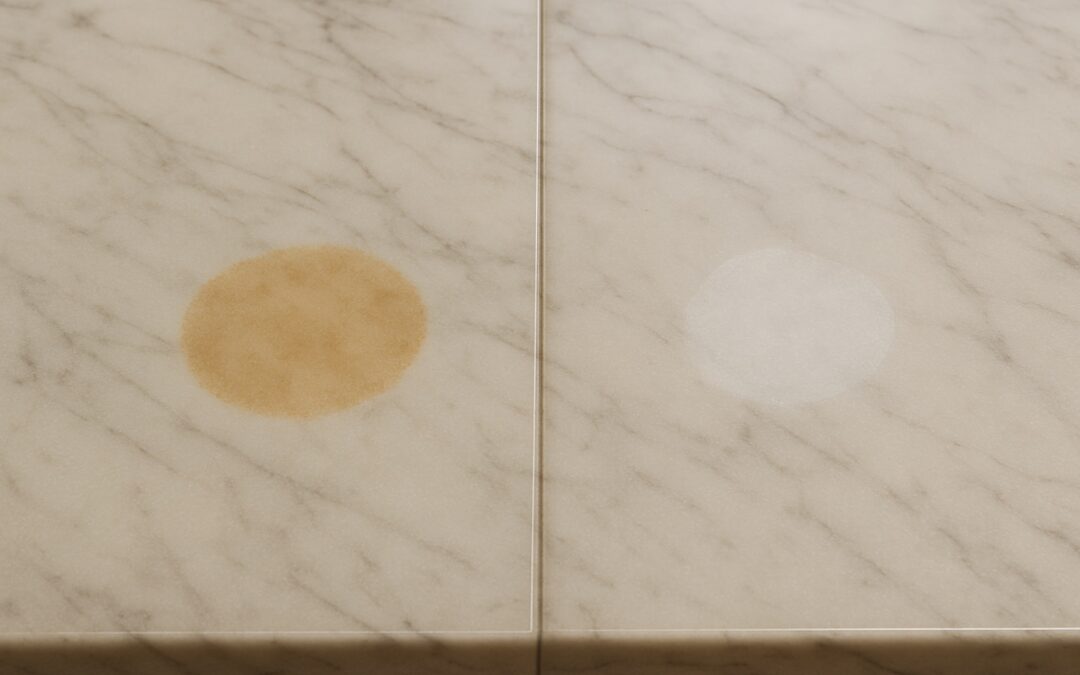Understand the difference — and how to prevent future damage.
Key topics covered in this article: Marble repair, marble etch removal, marble stain removal, AntiEtch®, stone sealing, natural stone protection
If your marble countertop or floor has developed cloudy spots, rings, or discoloration, you’re likely wondering: Is it stained? Is it etched? Can it be fixed? At NMotion Stone & Tile Restoration, these are some of the most common concerns we address for homeowners and property managers throughout Atlanta and surrounding areas.
This guide will help you understand what you’re seeing—and what you can do about it.
What Is Marble Etching?

Etching occurs when acidic substances (such as lemon juice, vinegar, wine, or certain cleaning products) come into contact with marble. Because marble is composed primarily of calcium carbonate, it reacts to acids by dissolving a thin layer of the surface.
Common signs of etching:
- Dull or light-colored spots
- Ring marks, especially from glassware
- Cloudy patches
- A subtle change in texture—etched areas may feel slightly rougher
Repair options:
Professional honing and polishing can remove most etch marks and restore the natural finish of the stone.
What Is Marble Staining?
 Staining is caused by substances that penetrate the porous surface of marble and discolor it from within. Common staining agents include coffee, red wine, cooking oils, makeup, and even water with a high mineral content.
Staining is caused by substances that penetrate the porous surface of marble and discolor it from within. Common staining agents include coffee, red wine, cooking oils, makeup, and even water with a high mineral content.
Common signs of staining:
- Dark spots or discoloration
- Irregular shapes that don’t respond to cleaning
- No change in surface texture—stains affect color, not polish
How to Tell the Difference
- Etching makes the surface appear dull or lighter and may feel rougher.
- Staining usually darkens the marble without affecting the surface texture.
Still unsure? Our team can diagnose the issue quickly, either in person or through a photo consultation.
How to Protect Marble from Etching and Staining
Prevention is key to keeping marble looking beautiful. Here are a few ways to protect your investment:
1. Use coasters, trays, and cutting boards:
Avoid direct contact between your marble surface and acidic or oily substances.
2. Seal your marble regularly:
Quality sealers can help prevent staining, though they do not protect against etching.
3. Install a protective coating:
At NMotion, we offer cutting-edge protective treatments like MORE® AntiEtch®—a long-lasting coating that defends against both etching and staining without altering the natural look of your stone.
4. Use pH-neutral cleaners:
Avoid acidic or abrasive cleaning products. Stick to stone-safe formulas designed specifically for marble and natural stone.
Marble Restoration Services in Atlanta and Beyond
NMotion Stone & Tile Restoration specializes in diagnosing, repairing, and protecting marble surfaces across the Greater Atlanta area—including Alpharetta, Roswell, Marietta, Decatur, and beyond. Whether you’re dealing with stains, etching, or both, our expert technicians can restore your marble to its original beauty and help you keep it that way.
Schedule a consultation today!


